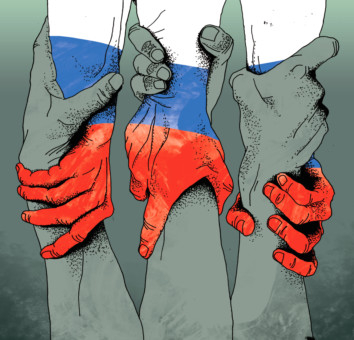
Russia’s move to kick-start the peace process on the Syrian front may not be a wild goose chase after all, judging by the adversaries and opposition groups who say they would be willing to meet in Moscow at the end of this month. This maybe a refreshing Godsend to start the New Year with, a concerted effort to end the deadly four-year-old Syrian conflict once and for all. This war has taken the lives of more than 200,000 people.
The welcome decision to meet by the Syrian regime, and at alternate periods of time — first between opposition groups and then between them and the members of the ruling Baath party — is indeed music to the ears of the Russian leadership. Under Russian Foreign Minister Sergei Lavrov, it has been preparing the ground. Lavrov has been shuttling between Damascus and Moscow at least since last November, well into December. This effort will no doubt be continued into the New Year. An all-systems-go is being planned for what is already being termed by the media as “Moscow 1”, coupled with a sense of showmanship.
The road ahead is difficult, and the goal may be near-impossible. But Moscow has a new chance to prove to itself, the Arab world and the international community that it can do good where others have failed; the tenuous diplomacy, in the form of Geneva I and II last year, was riddled with stumbling blocks, hiccups and eventual deadlock. As much as it is also about making fresh in-roads into solving the intractable conflict pitching groups against each other, both nationalist and Islamist, Moscow must see the coming meetings as a slick exercise in international diplomacy.
This maybe Russia’s chance to rehabilitate itself in the eyes of the West and the wider international community. Russia has long been seen as the aggressor, which allegedly favours starting trouble and recriminations with Ukraine and Crimea being only the latest episodes. There is a nagging feeling that Moscow under President Vladimir Putin has been making greater international efforts to assert Russian domination, not least in Syria.
But all this could be water under the bridge. This may be the right time to try to put the record straight as an honest broker — as honest as you can get in international politics by seeking to get warring parties to sit together in a seemingly neutral surrounding and have a “constructive engagement” to hammer out new deals and resolutions. It has already invited United Nations Special Envoy to Syria, Swedish-Italian Staffan de Mistura, to attend the peace talks. This is intended at giving an international tone to the talks and also to give them greater weight and backing. This is also aimed at extending greater support to all parties — the opposition groups as well as the regime itself. And all this is happening despite the fact that many opposition groups have long said their ultimate goal is the removal of Syrian President Bashar Al Assad and the Baath Party and creating a new government that would represent all strands of society and be seen as a national unity government for the whole of Syria, regardless of whether this is actually achievable or not.
Compromise solution
And what is more important is the agreement by those who represent the Syrian National Coalition in Turkey to attend the talks. This suggests that the opposition factions could well go for a compromise solution, much less than demanding Al Assad’s head and/or downfall of the regime. This may be because the Baath regime has shown itself to be resilient and not displayed any serious signs of collapsing, despite the stiff resistance from the opposition and the US-led coalition’s war on Daesh bases in the north of Syria and in Iraq.
While Al Assad maybe feeling less pressurised at the moment because of the continued strikes, Russia may also be quite happy to see the coalition embroiled in a conflict, which, by the admission of its war members, could take at least three years or more to complete. Therefore, the coalition is less likely to look elsewhere while it is mired in this imbroglio.
Apart from that, the Moscow meetings — which are designed to drag on because of the nature of negotiations as these are termed “preliminary consultations” — could well mean the start of talks-upon-talks and at the very least a snub to the West, especially the US, which is openly backing some of the opposition groups ever since the Syrian civil war began in March 2011. However, US President Barack Obama seems to be, and on the face of it, pleased to see that through such talks, the deadly Syria conflict may have a chance of coming to an end.
To this extent, although nobody is saying — not least of all the Russians, the Syrian regime itself and its backer Iran — the thinking in Moscow is for the eventual rehabilitation and containment of the opposition groups, divide them further and maybe even get them to accept the prevailing status quo under a different political formula. It will be like killing three birds with one stone: Moving on the Syrian front, mellowing the opposition groups and rehabilitating Russia internationally — an effective political posturing from a former superpower.
Marwan Asmar is a commentator based in Amman. He has long worked in journalism and has a Phd in Political Science from Leeds University in the United Kingdom.










